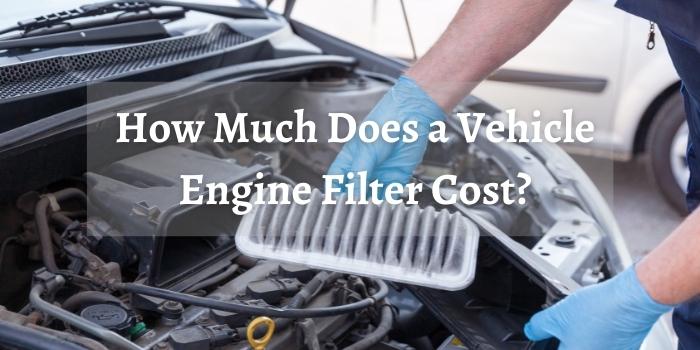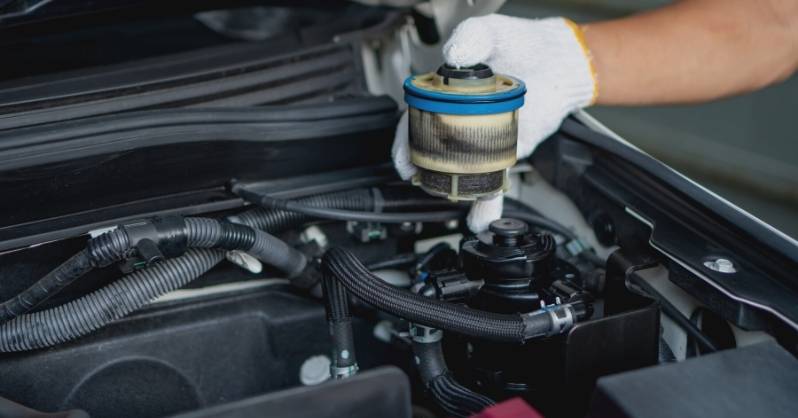As a vehicle owner, you know that it’s essential to keep your car in good condition. But did you know that it’s very important to keep the engine filter clean?
A dirty engine filter can lead to a wide range of problems, such as decreased fuel efficiency and reduced performance. So how much does an engine filter cost? Replacing an engine filter can cost you anywhere between $10 and $70, but the cost depends on certain factors.
This article will focus on these factors and once you go through it, you’ll be able to predict how much you’ll have to spend. So, let’s get right into it.

Cost of Engine Filter
Engine filters are an important part of keeping your engine running smoothly. They help to remove dirt, dust, and other debris from the engine, preventing damage and ensuring optimal performance.
Engine filters typically cost between $10 and $50, depending on the model of your car. However, if you do not change them regularly, they can become clogged and cause engine problems.
Additionally, you may need to pay for labor charges if you do not know how to change them yourself. The labor charges might cost from $60 to $170. So, you might want to replace it yourself if you want to save some cash.
Factors Affecting Engine Filter Cost
Here are some of the factors that affect the engine filter cost. Take a quick look so you know which type of filter will be suitable for you.
Size and Fit
Engine filters come in a variety of sizes, and the price of a filter can vary depending on the size. The size of the filter is important because it needs to be able to fit snugly over the engine’s air intake.
If the filter is too small, it won’t be able to filter out all of the contaminants in the air, and if it’s too large, it could restrict airflow and cause engine problems. As a result, it’s important to choose the right size filter for your engine.
Fortunately, most filter manufacturers provide sizing information on their products, so you can easily find a filter that will fit your engine.
Reusability
Most car engine filters are designed to be reused. This means that you can often clean and reuse them, which can save you money in the long run. However, reusability also affects the price of the filter.
Engine filters that can be reused are usually more expensive than those that need to be replaced after each use. This is because the reusable filters are designed to last longer and withstand more wear and tear.
As a result, they typically cost more up-front. Then again, if you’re looking to save money in the long run, investing in a reusable engine filter is a good option.
Quality
High-quality engine filters tend to be more expensive than their fewer effective counterparts. However, cheaper filters may need to be replaced more often, so it is important to weigh the initial cost against the long-term costs of ownership.
How Often Should You Replace Engine Filter?

Engine filters should be replaced every 12,000 miles or every year, whichever comes first. Engine filters play an important role in keeping your engine clean and running smoothly.
Certain other factors also affect this timeframe, such as the climate you’ll be driving the car in, the level of air pollution in that area, etc.
Over time, they can become clogged, which can reduce engine performance and cause engine damage. By replacing your engine filter regularly, you can help to keep your engine running at its best.
What Happens If You Don’t Replace Engine Filter?
One of the most important maintenance tasks for a car is regularly replacing the engine filter. If the filter is not replaced on a regular basis, it can lead to a number of problems.
The most serious issue is that dirty air can cause the engine to “knock,” or run inefficiently. This can lead to decreased fuel economy and increased emissions. In some cases, a clogged air filter can also affect the HVAC system of your vehicle. In extremities, this can lead to increased emissions.
In extreme cases, it can even cause engine damage. For these reasons, it is important to be diligent about replacing the engine filter according to the manufacturer’s recommendations.
Does Engine Filter Affect Gas Mileage?
Car owners are usually interested in preserving their gas mileage, and some might wonder if an engine filter affects gas mileage. The answer is complicated because there are many factors that can affect gas mileage. However, it’s certain that a dirty air filter can lead to decreased gas mileage.
A dirty engine filter restricts the flow of air to the engine, which can decrease fuel efficiency. In addition, a dirty air filter can cause the engine to work harder, which also uses up more gas.
However, other factors such as driving habits and vehicle maintenance can also affect gas mileage, so it’s important to consider all aspects of your car’s performance if you’re trying to improve your gas mileage.
Symptoms of Bad Air Filter
Bad air filters can cause various problems for your car, including decreased fuel efficiency, engine knocking, and increased emissions.
One way to tell if your air filter is bad is to check the airflow sensor. A clogged air filter will restrict the airflow to the sensor, causing it to output a higher signal than normal. This will result in the engine computer adding more fuel to the mixture in order to compensate.
Bad air filters can also cause engine knocking or pinging. The engine is not getting enough oxygen, and the fuel is detonating prematurely.
Finally, bad air filters can cause increased emissions. This is because the engine is not running as efficiently as it could be, and unburned fuel is being released into the atmosphere.
Conclusion
So, what’s the takeaway? If you want to save money on car repairs, in the long run, it’s important to replace your engine filter as often as recommended.
While a dirty air filter won’t necessarily ruin your engine, it will cause decreased gas mileage and a whole host of other problems that can be avoided by changing the filter on schedule. So, it’s better to spend that engine filter cost as it’ll save you from a ton of extra hassle.